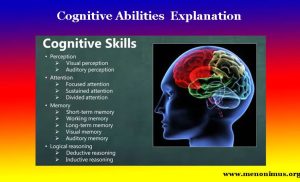Explore the fundamentals of cognitive abilities, their development, and their impact on daily life. Learn how to assess and improve mental skills through various methods and understand the factors that influence cognitive functions.
Cognitive Abilities-Explanation
Cognitive abilities, often referred to as cognitive functions or mental faculties, encompass a wide range of mental processes and skills that are crucial for human intelligence and problem-solving. These abilities involve the acquisition, processing, and utilization of information from the environment and within one’s own mind. Cognitive abilities are fundamental to how we perceive, learn, reason, remember, and interact with the world. They are integral to our overall cognitive development and functioning.
Here is an exhaustive explanation of the term “cognitive abilities,” covering the key components and types:
Definition and Overview:
Cognitive abilities refer to the mental skills and processes that enable individuals to think, reason, learn, remember, solve problems, make decisions, and engage in various intellectual activities. These abilities are central to human intelligence and play a critical role in daily life, education, work, and interpersonal relationships.
Components of Cognitive Abilities:
Cognitive abilities can be broken down into several distinct components, including:
Perception: The ability to perceive and interpret sensory information from the environment, such as seeing, hearing, tasting, smelling, and touching.
Attention: The capacity to focus on specific stimuli or tasks while filtering out irrelevant information.
Memory: The ability to store, retain, and retrieve information over time, encompassing short-term and long-term memory.
Language: The capacity to understand, use, and produce language, including reading, writing, speaking, and listening.
Reasoning: The process of drawing logical inferences, making deductions, and problem-solving.
Creativity: The ability to generate novel ideas, solutions, and concepts.
Executive Functions: Higher-order cognitive processes responsible for planning, organizing, initiating and completing tasks, and controlling impulses.
Spatial Abilities: Skills related to understanding and manipulating spatial relationships and visualizing objects in space.
Mathematical and Numerical Abilities: Proficiency in mathematical reasoning and numerical operations.
Emotional Intelligence: The ability to perceive, understand, manage, and regulate one’s emotions and the emotions of others.
Types of Cognitive Abilities:
Cognitive abilities can be categorized into various types based on their nature and function. These types may include:
Fluid Intelligence: The capacity to solve novel problems, think abstractly, and adapt to new situations.
Crystallized Intelligence: Accumulated knowledge and skills acquired through experience and education.
Verbal Intelligence: Proficiency in language-related tasks, such as reading, writing, and vocabulary.
Visual-Spatial Intelligence: The ability to perceive and manipulate visual and spatial information.
Quantitative Intelligence: Aptitude in mathematical and numerical tasks.
Social Intelligence: Understanding and effectively interacting with others, including empathy and interpersonal skills.
Working Memory: The ability to hold and manipulate information temporarily for cognitive tasks.
Development and Assessment:
Cognitive abilities develop and change throughout a person’s lifespan, with different abilities peaking at different stages. Various standardized tests and assessments are used to measure cognitive abilities, such as IQ tests, neuropsychological assessments, and educational evaluations.
Importance:
Cognitive abilities are essential for success in education, career, problem-solving, decision-making, and daily functioning. They play a vital role in shaping an individual’s quality of life and overall well-being.
In summary, cognitive abilities are the mental processes and skills that enable us to perceive, learn, think, reason, remember, and interact with the world. They are multifaceted, comprising various components and types, and are fundamental to human intelligence and functioning in everyday life. Understanding and nurturing these abilities are essential for personal growth and success. 0 0 0
Cognitive Abilities
(Article 2)
Cognitive abilities (skills) are the fundamental building blocks of how we think, learn, and interact with the world around us. They encompass a variety of mental processes and abilities that are essential for everyday functioning, including attention, memory, problem-solving, reasoning, and language comprehension. These skills are critical for personal development, academic success, professional achievement, and overall quality of life. Understanding the different types of cognitive skills and how they develop can provide valuable insights into how we can improve and maintain our cognitive health.
One of the most crucial cognitive skills is attention. Attention allows individuals to focus on specific stimuli or tasks while filtering out distractions. This skill is essential for learning and performing any task effectively. For example, a student must be able to concentrate on a teacher’s instructions while ignoring background noise in the classroom. Attention can be improved through practices such as mindfulness and meditation, which train the brain to maintain focus for extended periods.
Memory is another vital cognitive skill. It involves the ability to store, retain, and recall information when needed. Memory can be categorized into short-term and long-term memory. Short-term memory is used for holding information temporarily, such as remembering a phone number long enough to dial it. Long-term memory, on the other hand, is used for storing information over extended periods, such as recalling facts learned in school or remembering personal experiences. Enhancing memory can be achieved through mnemonic devices, repetition, and engaging in activities that challenge the brain, like puzzles and memory games.
Problem-solving is a cognitive skill that enables individuals to identify solutions to complex issues. It involves analytical thinking, creativity, and the ability to apply knowledge to new situations. Problem-solving is essential in both everyday life and professional settings. For instance, a software developer must troubleshoot and fix bugs in a program, while a parent might need to resolve conflicts between children. Improving problem-solving skills can be done through exercises that encourage critical thinking, such as brainstorming sessions and case studies.
Reasoning is the cognitive ability to draw conclusions and make decisions based on available information. This skill is crucial for making informed choices and understanding the relationships between different concepts. Reasoning can be divided into deductive reasoning, which involves drawing specific conclusions from general principles, and inductive reasoning, which involves making generalizations based on specific observations. Activities that stimulate reasoning include logic puzzles, strategy games, and debates.
Language comprehension is the ability to understand and process spoken and written language. This cognitive skill is fundamental for communication, learning, and social interaction. Effective language comprehension involves not only understanding individual words and sentences but also grasping the overall meaning and context. Enhancing language comprehension can be achieved through reading, engaging in conversations, and learning new languages.
The development of cognitive skills is influenced by both genetic and environmental factors. Genetics play a role in determining the baseline capabilities of an individual’s cognitive functions. However, environmental factors such as education, social interactions, and lifestyle choices significantly shape and enhance these skills. For example, a stimulating educational environment can foster critical thinking and problem-solving abilities, while social interactions can improve language comprehension and memory.
Maintaining and improving cognitive skills is essential for overall mental health and well-being. Engaging in activities that challenge the brain, such as learning new skills, playing intellectually stimulating games, and maintaining an active social life, can help keep cognitive abilities sharp. Additionally, physical exercise, a healthy diet, adequate sleep, and stress management are crucial for supporting cognitive health.
In conclusion, cognitive skills are the mental capabilities that enable individuals to process information, learn, solve problems, and make decisions. These skills, including attention, memory, problem-solving, reasoning, and language comprehension, are essential for personal and professional success. By understanding how these skills develop and employing strategies to enhance them, individuals can improve their cognitive functions and lead more fulfilling lives. Engaging in continuous learning, maintaining a healthy lifestyle, and challenging the brain through various activities are key to fostering and preserving cognitive abilities.
Cognitive Abilities-FAQs
What are cognitive abilities?
Cognitive abilities are the mental skills and processes that allow us to carry out any task from the simplest to the most complex. These abilities include various mental processes such as attention, memory, reasoning, problem-solving, decision-making, and language comprehension. They are essential for learning, understanding, and interacting with the world around us.
How do cognitive abilities develop?
Cognitive abilities develop through a combination of genetic factors and environmental influences. Early childhood experiences, education, and social interactions play a significant role in shaping cognitive development. The brain continues to develop and change throughout life, allowing for the possibility of improving cognitive abilities through practice and learning.
Can cognitive skills be improved?
Yes, cognitive abilities can be improved through various methods such as mental exercises, physical activity, healthy diet, adequate sleep, and continuous learning. Engaging in activities that challenge the brain, such as puzzles, reading, learning new skills, and playing certain types of games, can help enhance cognitive functions.
What are some common cognitive skills?
Some common cognitive skills include attention, which involves focusing on specific information while ignoring distractions; memory, which involves storing and recalling information; problem-solving, which involves finding solutions to complex issues; reasoning, which involves concluding available information; and language comprehension, which involves understanding spoken and written language.
How do cognitive abilities affect daily life?
Cognitive abilities impact nearly every aspect of daily life, from making decisions and solving problems to learning new information and communicating effectively. Strong cognitive abilities can lead to better academic and professional performance, improved problem-solving skills, and more effective communication. Conversely, difficulties with cognitive abilities can affect one’s ability to perform everyday tasks and negatively impact quality of life.
What factors can negatively affect cognitive abilities?
Several factors can negatively affect cognitive skills, including aging, stress, lack of sleep, poor nutrition, and certain medical conditions such as dementia, depression, and brain injuries. Substance abuse and chronic health issues like diabetes and hypertension can also impair cognitive functions.
How are mental abilities assessed?
Mental abilities are assessed using various standardized tests and assessments designed to measure specific mental functions. These assessments can include IQ tests, memory tests, problem-solving tasks, and language comprehension tests. Cognitive assessments are often used in educational settings, clinical environments, and during psychological evaluations to understand an individual’s cognitive strengths and weaknesses.
What role do cognitive skills play in education?
Cognitive skills are crucial in education as they directly influence learning and academic performance. Skills such as attention, memory, reasoning, and problem-solving are essential for understanding and retaining new information, completing assignments, and performing well on exams. Enhancing cognitive abilities can lead to improved academic outcomes and greater success in educational pursuits.
Are cognitive abilities the same as intelligence?
While cognitive skills and intelligence are related, they are not the same. Cognitive abilities refer to specific mental processes used to carry out tasks, while intelligence is a broader concept that encompasses overall mental capacity, including the ability to learn, understand, and apply knowledge. Intelligence is often measured using IQ tests, which assess a range of cognitive abilities.
Can lifestyle choices impact cognitive skills?
Yes, lifestyle choices can significantly impact cognitive skills. Engaging in regular physical exercise, maintaining a healthy diet, getting adequate sleep, managing stress, and staying mentally active through learning and challenging activities can all contribute to better cognitive health. Conversely, poor lifestyle choices such as a sedentary lifestyle, unhealthy diet, lack of sleep, and high-stress levels can negatively affect cognitive functions.
What are some equivalent phrases for ‘cognitive abilities?
1. Mental skills
2. Cognitive skills
3. Intellectual capabilities
4. Mental faculties
5. Cognitive functions
6. Intellectual abilities
7. Mental capacities
8. Cognitive capacities. 0 0 0.
You May Like:







